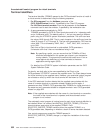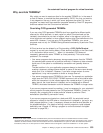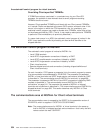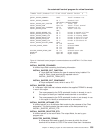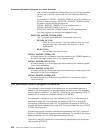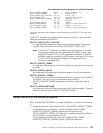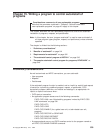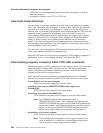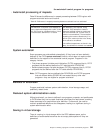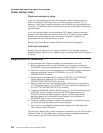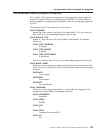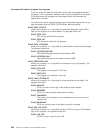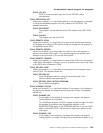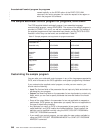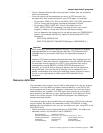v CICS calls any user-replaceable program other than the program or terminal
autoinstall program.
v A program is named in the PLTPI or PLTSD list.
Autoinstall model definitions
Like autoinstall for terminals, program autoinstall uses model definitions, together
with a user-replaceable control program, to create explicit definitions for resources
that need to be autoinstalled. The purpose of a model is to provide CICS with a
definition that can be used for all programs with the same properties. CICS calls the
autoinstall control program with a parameter list that includes the name of a
CICS-supplied, default model definition appropriate to the program type (program,
mapset, or partitionset). Your autoinstall control program can accept the default
model, or specify another (any installed program definition can be used as a
model). It can also specify explicitly any properties that are unique to a program,
thus overriding those specified on the model definition. It can specify that a local or
a remote definition should be installed.
On return from the control program, CICS creates a resource definition from the
model and properties returned in the parameter list.
Note that CICS does not call your control program for CICS programs, mapsets, or
partitionsets—that is, for any objects that begin with the letters “DFH”.
Autoinstalling programs invoked by EXEC CICS LINK commands
Distributed program link (DPL) requests can be dynamically routed. (For information
about the dynamic routing of DPL requests, see the
CICS Intercommunication
Guide
.) This section describes the relationship between the autoinstall control
program and the dynamic routing program.
When the autoinstall control program is invoked because there is no installed
definition of a program named on an EXEC CICS LINK command, it can install:
A local definition of the server program
CICS runs the server program on the local region.
A definition that specifies REMOTESYSTEM(remote_region) and
DYNAMIC(NO)
CICS ships the LINK request to the remote region.
A definition that specifies DYNAMIC(YES)
CICS invokes the dynamic routing program to route the LINK request.
Note: The DYNAMIC attribute takes precedence over the
REMOTESYSTEM attribute. Thus, a definition that specifies both
REMOTESYSTEM(remote_region) and DYNAMIC(YES) defines the
program as dynamic, rather than as residing on a particular remote
region. (In this case, the REMOTESYSTEM attribute names the
default server region passed to the dynamic routing program.)
No definition of the server program
CICS invokes the dynamic routing program to route the LINK request.
Note: This assumes that the autoinstall control program
chooses
not to
install a definition. If no definition is installed because autoinstall
fails, the dynamic routing program is not invoked.
the autoinstall control program for programs
540
CICS TS for OS/390: CICS Customization Guide
|
|
|
|
|
|
|
|
|
|
|
|
|
|
|
|
|
|
|
|
|
|
|
|
|
|
|
|



